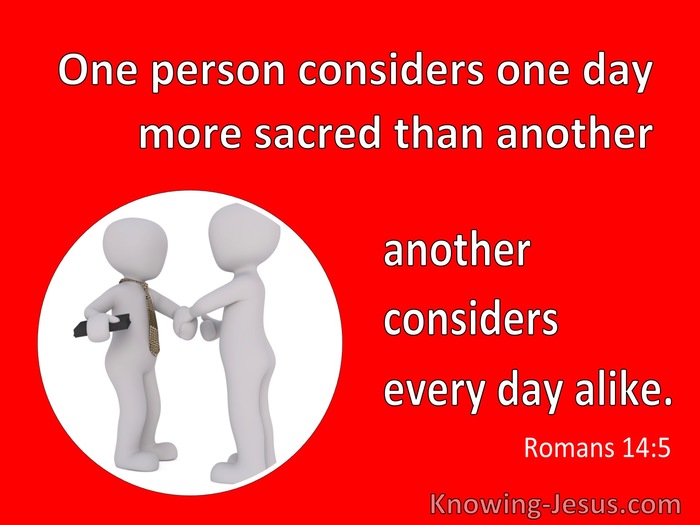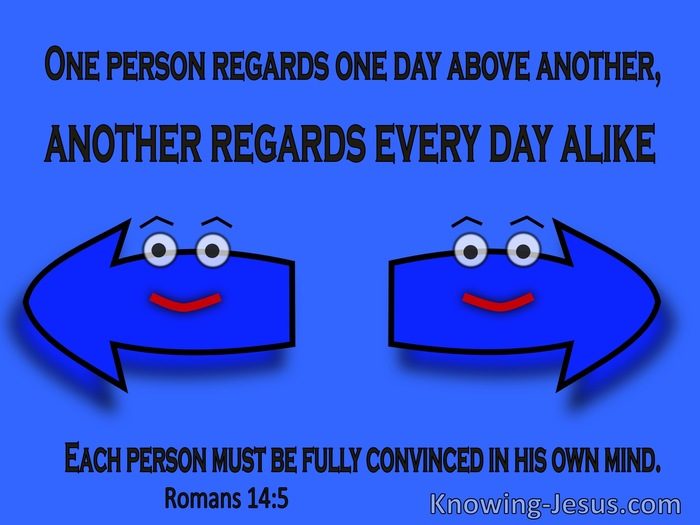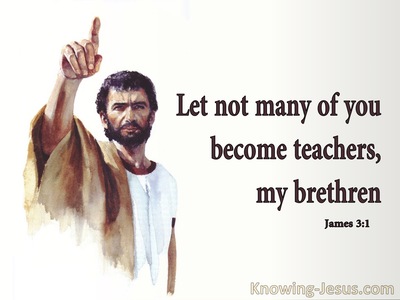◄ What Does Romans 14:5 Mean? ►
One person regards one day above another, another regards every day alike Each person must be fully convinced in his own mind.
Romans 14:5(NASB)
Verse of the Day
In Romans 14, Paul touches on an important biblical principle of living in the liberty we have in the Christ Jesus while addressing our attitude towards fellow believers whose viewpoints may differ from our own. They may come from a different culture, participate in alternative customs, or find their conscience forbids them to behave in a certain way, or they may enjoy the complete liberty that is ours in Christ.
Paul explains: "One person is free to regard one day above another day, a fellow believer may exercise his freedom to regard every day alike." Unlike Israel, who were given very specific laws regarding feast and Sabbath days, rules about eating and rituals for cleansing, priestly duties, and a wide range of other requirements, Christians in the Church dispensation are not governed by the Mosaic Law or any other law.
Christians are given the freedom to choose when and how to worship and we have the liberty to choose what to eat or what to wear. We are not required to approach the Lord in a set way, once a year, through an earthly priesthood, to have our sins covered. We have the freedom to approach the throne of grace at any time, for mercy to find help in time of need.
Instead of being under the Law, we are governed by broad principles which enables each believer to decide for themselves what conduct they consider appropriate and what behaviour they do not. Examples would cover things like eating or drinking, the clothes we wear, or the recreational activities we enjoy. It would cover when and where to worship and would impact choices about holidays, schooling, make-up, and a myriad of other practices or lifestyles.
Because we are given broad guidelines, we have the freedom to make personal choices. This could cause the liberty one believer enjoys to destabilise the faith of a weaker brother-in-the-faith. One believer might be comfortable engaging in a certain activity that a fellow believer may prefer to avoid because it injures their conscience. Paul is teaching that both are correct in their choices but neither should be of critical the other: "Each person must be fully convinced in mind."
There are, of course, moral laws Christians should always obey (like do not steal or covet), government regulations to follow (like speeding or safety), and inner issues (like pride or greed), that should be eschewed. Similarly, there are doctrinal issues that are non-negotiable, such as believing in the deity of Christ and His sacrifice on the Cross, while other matters of secondary importance permit freedom of choice. And Paul is giving guidelines on the free-will choices we have in life and the attitude we should adopt towards those who choose an alternative.
It is very easy to find fault with fellow believers who do not adhere to the choices we make, and too often this has caused individuals, churches, and denominations, to protect their opinions by building up their own set of rules and regulations while condemning fellow Christians who have an alternative view.
Some like to worship on Sunday, others choose a different day to praise God, while some prefer to regard every day alike. There are other controversial issues like celebrating Christmas and Easter, entering a public house, drinking beer, swimming in a swimming pool, avoiding meat or the eating of meat, playing cards, watching TV, dancing, or attending a concert. These are a few of the issues that have divided brothers and split churches, unnecessarily.
It is ironic that foolish divisions and judgemental condemnation have often resulted from our freedom in Christ, but we also have a responsibility towards our brothers and sisters, especially those that are weaker in their faith. We should be sure our liberty does not cause them to stumble and we should be careful that we do not allow our liberty to stray into legalism and condemnation of those who make different choices.
May we rejoice in the liberty we have in Christ while learning to be considerate towards the need and sensitivities of others. May we recognise that there are actions and behaviours that may be OK for us while they are not for others. May we respect the choices and decisions of others who lack the freedom we enjoy in our Christian life and be careful not to judge others who, for some reason, are less emancipated in their faith.
My Prayer
Heavenly Father, how I praise and thank You for the freedom I have in Christ. I am not under the restrictions of the Law, but under the freedom of grace. I pray that I would make choices in my life that honour You. Help me to heed Paul’s instructions to be mindful of the needs of others who may be weaker in the faith, or who do not enjoy the breadth of liberty I have in You. Give me a sensitive spirit to the needs of others, and keep me from any criticism of believers who make different choices in the non-essentials of the Christian faith. Keep me low at the Cross and broken before You, for His name’s sake. In Jesus' name I pray, AMEN.
Choose a Verse from Romans 14
Romans 14:5 Further Study
- Romans 14:5 in the Parallel Bible
- Romans 14:5 in the Thematic Bible
- Romans 14:5 Cross References
- Romans 14:5 Treasury of Scripture Knowing
- Romans 14:5 Sermons
- Romans 14:5 Prayers
- Romans 14:5 Images
- Choose Chapter
Never miss a post















